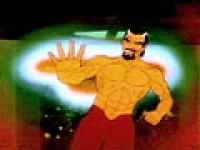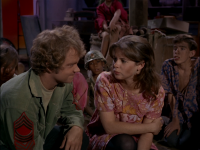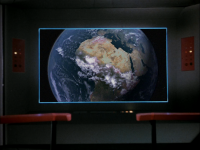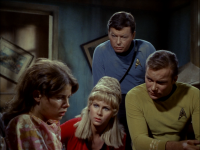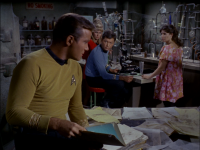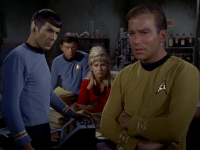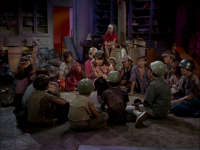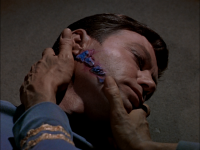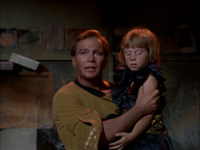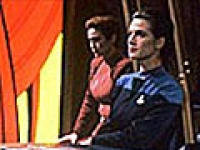Star Trek: Newest — 1x08 — Veritas
Synopsis
Mariner, Boimler, Tendi, and Rutherford are caught off guard when aliens force them to testify about a series of seemingly unrelated events.
Remarkable scenes
- The clumsy censoring in Tendi's flashback.
- Tendi functioning well under pressure on the secret mission.
- The Q cameos.
Review
While the Q cameos were charming and there are some nice moments of levity in Tendi's flashback, the rest of the episode is a jumbled mess. The surprise twist at the end inexplicably turning the tone from scary to goofy on a dime bends suspension of disbelief to the breaking point especially given that the episode opens with the characters being abducted and put into a cage against their wills and later threatened with "death by eels." There are countless intentional holes in the plot thanks to the numerous out of context flashbacks that aren't connected together in any coherent way making the whole story quite hard to follow. Yes, the story intentionally favored mystery over suspense, but just because it was intentional doesn't mean it was good idea. Moreover, much of the plot was once again driven by Rutherford's implant's magic superpowers and once again no attempt was made to explain why he has the implant, why it's so powerful, and why more people don't get them. Plus the marathon of references to previous Star Trek episodes reverted to the pilot's tendency to overload us will banal surface level one liners rather than anything substantive. A real clunker.
Star Trek: Newest — 1x08 — Broken Pieces
Synopsis
When devastating truths behind the Mars attack are revealed, Picard realizes just how far many will go to preserve secrets stretching back generations, all while the La Sirena crew grapples with secrets and revelations of their own. Narissa directs her guards to capture Elnor, setting off an unexpected chain of events on the Borg cube.
Remarkable scenes
- Seven of Nine rescuing Elnor.
- Picard gloating to Admiral Clancy about being right and then demanding a whole squadron of ships from her. Clancy: "Admiral Picard with all due respect and at long last, shut the fuck up! I'm sending a squadron to rendezvous with you at DS12, now stay put until they get there!"
- Soji to Picard about Data: "He loved you."
- Agnes marveling at Soji.
- Narissa executing the remaining xBs.
- Picard, making a confident attempt to fly the ship: "...Actually, I don't know how to work this."
- Seven of Nine stealing the Borg cube.
Review
The various plot threads are starting to come together and paint a clearer picture of what this story is adding up to which is sadly a mixture of bad and possibly worse depending on what happens in the following episodes. First and most importantly, we find out here that the Zhat Vash were radicalized by a prophecy of destruction brought about by the prospect of AI advancing too far. This "admonition" warns against the advancement of AI, driving those who experience it to madness, literally. Back in Maps and Legends when Laris first described the Zhat Vash as keeping a secret "so profound and terrible that just learning it can break a person's mind" we had hoped this lame remark was simply hyperbole we could cough over and move on from. Apparently not. Here we see people kill themselves, smash rocks into their faces, tear off hair and skin, etc. All because of a vision they experienced from an alien beacon.
Making matters worse, this madness was somehow enough to break the collective mind of the Borg as well. It's explained that the Borg cube the Romulans commandeered was broken by the assimilation of Narissa's aunt Ramdha, whose mind had been broken by the "admonition." While this is not exactly unprecedented since something similar occurred when Hugh was reassimilated by the Borg after the events of TNG: I, Borg, it was pretty lame then, and it's even more lame now. The idea that resistance to assimilation just requires a sufficiently strong-willed or traumatized mind is difficult to reconcile with the fact that the assimilation process itself is traumatic and the Borg have undoubtedly assimilated billions of strong-willed people before. It simply isn't credible that Ramdha could break the Borg through the "sheer force of her despair" or that Hugh's newfound individuality would be so profound that it could somehow corrupt the cube that retrieved him entirely on its own.
To make it credible, there had to be more going on than just asserting that these characters had stronger feelings than anyone else who had ever been assimilated, so therefore they were immune to it. But the narrative seems to expect us to just believe that strong feelings was all it took. Damn it Magnus and Erin Hansen, if only you just had stronger feelings about being assimilated, maybe you could've broke the Borg and prevented Annika from being assimilated and becoming Seven of Nine, huh? Speaking of Seven, her return is a welcome one and one of the only bright spots in the episode. Her reticence regarding establishing a micro collective is a nice callback to her actions in Voy: Survival Instinct. But speaking of that episode, it sure is a shame that Lansor (Two of Nine), Marika Wilkarah (Three of Nine), and P'Chan (Four of Nine) didn't just have stronger feelings about Seven of Nine reassimilating them, huh? Maybe they could've broke her and gotten away like Hugh and Ramdha. It's bizarre that the writers didn't think through how obviously dumb the "strong feelings break the Borg" plot point was and give us a bit more to hang our hats on. To be fair, it's not an impossible problem to fix. Maybe Hugh had the Borg virus embedded in him against orders by a renegade Enterprise crewman. And Maybe Ramdha had something similar embedded in her after experiencing the "admonition." But it sure would've been nice if the episode established something like that as a fact rather than us having to offer up our own solutions to these problems, huh?
There is a similar problem with Agnes. The previous episode did nothing to convince us that the mind meld she had with Commodore Oh was at all coercive. It was strongly implied that Agnes assassinated Maddox entirely of her own free will because the visions she received were somehow sufficiently persuasive enough to get her to murder a man she loved. In this episode she continues to exhibit no signs of mind control and even deliberately chooses not to do any harm to Soji despite Soji being the literal personification of the threat she supposedly was so convinced was urgent that she would murder her lover. There is a way out of this plot hole too if we extrapolate a bit from the scene when she was asked why she did this and replied she "had to," that Commodore Oh had put "poison" in her mind, and a "psychic block" was put in place to keep her from talking about it. From that we could make a leap of logic that what she really meant was she was under the influence of mind control and the murder was something she did without consciously choosing to, like a sleeper agent. But that's quite a leap from the material presented to us which seems to strongly imply otherwise. She continues to refer to Maddox' work as "hubris" and seems to still genuinely fear the prophecy coming true. But again she doesn't fear it enough to take action against Soji. So it's all a jumbled mess. Agnes' motivations make no sense and this is becoming a serious problem that it seems more and more likely the plot won't resolve anytime soon.
Rios too is now a problem. Instead of just immediately telling everyone that Soji looks just like an android his former captain murdered, he decides to get all moody and hide from everyone for no coherent reason. But a bigger problem is how that development nudges this story away from a charming tale about a motley crew brought together for idiosyncratic reasons into a trite tale about everyone being linked together by destiny. It's a ridiculous coincidence that Picard just so happened to befriend the only person in the Federation to correctly predict Romulan involvement in the Mars attack and that she just so happened to be friends with a random mercenary pilot who just so happened to be randomly connected to the exact conspiracy Picard sought to unravel.
The worst thing about this episode though is how it undermines the promise of the pilot. The pilot offered up the possibility of a real reflection on the Federation flirting with reactionary anti-technology politics. It would've been nice to see more backstory showing us substantive public debate about this and how it intertwines with holograms and previous reactionary material on Star Trek regarding genetic engineering. But we got none of that. The ban was just the result of a Romulan conspiracy. No deep meditation on reactionary politics. The writers don't appear to have noticed the parallels between the AI ban and the genetic engineering ban. Nor did they notice that holograms are AI too. They must not have seen Voy: Revulsion where it's shown that a hologram that can fly a ship can be just as serious a threat as any android.
At the end of the episode Picard delivers a speech to Rios about how the Federation should not have given way to fear that the directing clearly emphasizes as some kind of profound moment; as if a few lines from Picard are the payoff on the deep meditation on reactionary politics we were promised. But the narrative didn't earn that moment at all. It fell just as flat as Burnham's speech at the end of Discovery's first season about how the Federation ought not to "allow desperation to destroy moral authority." You can't just trot out some high minded-sounding platitudes at the end of the story and expect that to serve as a reasonable substitute for narrative substance. Worse yet, Picard's whole point about how secrecy and fear are as ineffective as they are immoral is kind of ridiculous in itself given that secrecy and fear scored the Zhat Vash an AI ban in the Federation that lasted for more than a decade. Seems like manipulating people with secrecy and fear is actually pretty effective sometimes after all.
Overall this is a very disappointing offering. When writers build up something across a season of episodes, the payoff has to be worth it. We're seeing some payoff here and so far it's pretty damn anticlimactic.
Star Trek: Newest — 1x08 — Si Vis Pacem, Para Bellum
Synopsis
The U.S.S. Discovery is tasked with a high priority mission to planet Pahvo and learn the science behind the Klingon's cloaking technology.
Remarkable scenes
- The battle to save the Gagarin in vain.
- L'Rell pretending to torture Cornwell to get a moment alone to talk with her and expressing her wish to defect.
Review
This episode had a promising start. In addition to the cool space battle, we finally see Stamets is suffering from some concerning consequences of piloting the spore drive again, L'Rell is conclusively revealed to have been the same Klingon female captain who held Tyler, Mudd, and Lorca captive (the scar matches the injury she suffered during Lorca's and Tyler's escape), and L'Rell engages in some kind of plot to overthrow Kol. But none of these plots get a chance to sufficiently develop. The Stamets stuff is swept under the rug quickly and the L'Rell plot dangles several loose threads in the most annoying possible fashion. For instance, is Cornwell really dead? It looked like L'Rell intended to deceive Kol and revive her after staging the fight where she killed her. But if so, then did she succeed in deceiving Kol about Cornwell being dead? And if that was her intent, then she sure took her time reviving Cornwell, what with that lengthy scene mourning her dead comrades and then seemingly getting her cover blown by Kol anyway. Instead of coming off as a dramatic cliffhanger as the narrative seemingly intended, it just comes off as annoyingly vague.
Meanwhile, on Pahvo, AKA Disney's Pocahontas planet of perfect balance and absolute harmony, every tree, rock, and blade of grass vibrates with its own specific tone. Together these combine to form a kind of music. Nobody on the landing party could quite tell what song it was, but obviously it was Colors of the Wind. After all, according to Saru everywhere you go you can feel the symbiosis between nature and the living spirit. Groovy, man! Perhaps every rock and tree and creature has a life, has a spirit, has a name! Perhaps if Saru meditates hard enough, he'll be able to paint with all the colors of the wind!
Even setting aside awkward aesthetic similarities to one of Disney's less savory films, just about every detail of the away team plot is cringeworthy from start to finish. For starters, as soon as they discover the swirly alien spirits, Saru immediately abandons the mission of directly examining the giant transmitter thing to study the alien life form despite the fact that they're on a ticking clock. Even if they were making good time as they said, you'd think they'd want to stay focused on their primary mission of investigating this technology for the war effort rather than exhibit this "oh look, a squirrel!" degree of distractibility. Compounding this irrational decision-making process, Saru immediately insists that his risky behavior couldn't possibly bear any risk because—and he proclaims this with total certainty—if the aliens meant them any harm, then his threat ganglia would surely sense it. The overwhelming stupidity of the concept of threat ganglia notwithstanding, everyone seeming to just tacitly accept the notion that threat ganglia are straight up infallible adds yet another layer of cringe.
Saru isn't the only one smoking the peace pipe though. Burnham prattles off a range of reckless, dumb lines insisting on following first contact protocol rather than use the transmitter tech, even after Saru is compromised. Tyler has to argue with her to try to talk her down from all that. Ultimately he seems to fail to convince her and resorts to simply ordering her to do her job and complete their mission to use the alien tech to build a cloaking device unmasker. And even Tyler doesn't seem immune to the planet's numbing effects on rational thinking when he idiotically equivocates when reciting the famous Vulcan idiom "the needs of the many outweigh the needs of the few," reversing it to "so are the needs of the few or the one." He basically says to Burnham let's not complete our mission and let lots more people die so we can have our forbidden love. What uninspired melodrama.
Then when Saru goes to stop Burnham, Burnham looks up, sees Saru coming, and instead of pulling out her phaser to stun Saru, she turns her back to him, continues to fiddle with the computer, and ultimately allows Saru to disarm her and destroy her work. Only after that does she realize hey it might be a good idea to grab that phaser and stun Saru after all. A bit slow on the uptake there, huh? In any event, all is well. The aliens then conveniently transport Tyler to Burnham, conveniently fix the broken computer, and Discovery then conveniently arrives instantly to pick them up. Behold, everything moving at the speed of plot!
But the cringe doesn't end there. The annoying Pahvo plot isn't done making the characters act like morons. Because it turns out Saru wasn't under some kind of alien coercive influence at all. Burnham gives him that out when she says "you weren't yourself," but Saru will have none of that. "But I was!" he insists, determined to destroy all credibility he has as a character. "My whole life I've never known a moment without fear!" You see, the narrative expects us to find it believable that Saru would try to trap his comrades on that planet forever on a whim and forget all about the war and his responsibilities to the Federation simply because he's learned the bliss of painting the colors of the wind. But then perhaps that is par for the course for an episode which pretentiously names itself Si Vis Pacem, Para Bellum (a latin adage which translates to "if you want peace, prepare for war") with only the loosest attempts in the plot to justify the false profundity of such a title. What a mess.
Star Trek: Newest — 1x08 — Breaking the Ice
Synopsis
While the Enterprise crew researches a newly discovered comet, Archer tries to deal diplomatically with a Vulcan ship that is suspiciously watching them.
Remarkable scenes
- The children's drawings.
- The discovery of and landing on the comet.
- Archer answering the 4th grade children's questions.
- Trip: "A poop question, sir?" I almost died laughing.
- Phlox talking too much on the recording.
- Travis and Reed building a snowman.
- The discovery that T'Pol's communications were personal, not malicious.
- Trip apologizing to T'Pol.
- Archer to T'Pol regarding Vanik: "Help me make him go away."
- Reed enhancing the snowman with Vulcan ears.
- Vanik's behavior at the dinner.
- Vanik: "Your inexperience and your arrogance are your enemies, not us."
- Trip advising T'Pol.
- The shuttlepod sinking into the ice.
- Trip trying unsuccessfully to use the grappler to retrieve the shuttlepod.
- Archer finally giving in and accepting the Vulcan ship's help.
Review
And now for some hardcore character development. This episode was most successful because it didn't involve any alien conflict or phaser fights, but just chronicled the ship as they investigated a comet. Rarely do we get something so mundane in Star Trek done so well. I was worried that Vanik might end up having some silly hidden agenda and that T'Pol might be involved in some kind of Vulcan conspiracy, like was revealed at P'Jem last week. But thankfully I was wrong. Instead, we watch as Trip helps T'Pol bridge her cultural barriers. She accepts his advice to make her own decision instead of letting rigid Vulcan custom determine her marriage and her career. She even tries some of Trip's pecan pie in the final scene. Archer learns to back away from his Vulcan prejudice too when he accepts help from Vanik. I'm just glad Archer didn't ask Vanik a "poop question" at the dinner among is many attempts at small talk. And Reed... well, I think Reed's just happy he found something to blow up again. Although I think he (along with Travis) took just as much perverse pleasure in building the Vulcan snowman with the oversized ears too. One lingering question... why do shuttlepods seem to have a dangerous habit of sinking into whatever they land on? ;)
Star Trek: Newest — 1x08 — Ex Post Facto
Synopsis
Paris is convicted of murder.
Remarkable scenes
- The Doctor discussing the choosing of his name with Kes. One of the names the Doctor was considering was Spock. :)
- Paris: "Smoking is a bad habit. My species gave it up centuries ago when we finally got it into our heads it was killing us." Lidell: "You must be a very superior species." Paris: "That's not what I meant." Lidell: "Maybe I kill myself slowly because I don't have the courage to do it quickly."
- Chakotay's "play dead" trick.
- Neelix, regarding Tuvok's proposition of mind melding with Paris: "A, a what? What, what did he say? A mind what?"
- The Doctor's objections to Tuvok's mind meld idea. The Doctor: "Believe it or not, I know more about mind melds than you do!"
- Paris regarding taking another man's woman: "Some day it will be you Harry. You'll meet her and you'll know it's wrong from the first moment you see her. And you'll know there's nothing you can do about it.'"
- Tuvok uncovering the Numiri plot.
- Tom's way of expressing his gratitude to Tuvok.
Review
This episode uses the classic "flashback" story template. Meaning, we see the effects of the story (Paris' sentence) before the cause (the story of the murder). Fortunately, it doesn't dominate the story, like certain other episodes do. So only parts of the story are wasted, which is mostly the beginning. So the episode gets off to a bad start, but eventually becomes interesting when Tuvok begins his criminal investigation. Tuvok is my favorite character on Voyager, and it's nice to see him shine here. As nice a job as Tuvok did though, the Numiri couldn't have done a worse one. Surely there would have been easier ways to transmit intelligence info than to encode military secrets in someone's mind, set this person up for a murder conviction, and then steal the prisoner? The episode has weak points, but overall comes off as pretty solid, so I don't take off too many points.
Star Trek: Newest — 1x08 — The Magicks of Megas-Tu
Synopsis
While investigating the theory of creation, the Enterprise is caught inside an energy/matter tornado and pulled to the center of the galaxy.
Remarkable scenes
None
Review
Oh boy. An impossible travel to the center of the galaxy, blatant disregard for the law of conservation of matter/energy, magical powers coming real without any kind of rational explanation. This episode features some of the worst science ever featured in Star Trek. Quite possibly the worst episode of Star Trek ever made. Only the idea that the aliens lived on Earth in ancient times and were persecuted for their magical powers at the Salem witch trials is interesting. An advanced race's natural abilities would indeed seem like magic. Though, unfortunately, this episode claims that it actually WAS magic. Furthermore, this episode contradicts its own already frail explanation for the magic. The episode claimed the magical powers can only exist in that alien dimension. So how did the aliens use their magical powers while on Earth? Also, I like the crack on religion in this episode; Lucifer = good guy. Though those nice little details aren't enough to save this most dreadful episode.
Star Trek: Newest — 1x08 — Miri
Synopsis
A strange group of children are discovered on an Earth-like planet.
Filler rating: bad filler
One of Star Trek's worst episodes and complete filler.
Remarkable scenes
- Spock: "It could be a beaker full of death."
Review
An episode about children who age very slowly and then die at puberty doesn't sound like that bad of a story until you factor in the fact that the entire thing takes place on another planet which is inexplicably exactly like Earth where apparently a second evolution of humanity lives. Add to that, none of the characters seem terribly interested in investigating why another planet exactly like Earth complete with a second evolution of humanity could exist. Instead, the entire episode focuses on the plight of the children whose acting performances are insufferably embarrassing to watch.
Even setting aside all of that, the plot is meager and fails to adequately explain how the children could have possibly been able to gather food for 300 years without trouble or why their food source is finally beginning to run out conveniently just as the Enterprise arrives. Likewise, I've got to wonder just how so many of the children, and especially Miri, were able to keep their clothes so pristine after all this time. But it's a necessary plot contrivance, I suppose. After all, how could Kirk seduce a prepubescent girl if she didn't have pretty clothes? Do yourself a favor and skip this one.
Star Trek: Newest — 1x08 — Dax
Synopsis
Curzon Dax, Jadzia's former Trill identity, is accused of murder.
Filler rating: bad filler
Unless you're dying to see the first episode to mention Raktajino, there's nothing terribly notable in this one.
Remarkable scenes
- Bashir flirting with Dax again.
- Kira and Sisko finding a political loophole to keep Dax on board.
- Odo blackmailing Quark into cooperation.
- The arbiter. She's hilarious.
- Sisko making an entirely bias argument in Dax' favor.
- Odo interrogating Enina Tandro.
- Arbiter: "Lieutenant Dax, you are either 200 years older than I am or you're about the same age as my great granddaughter. At first I wondered which of those you were. But now I am bothered by the likelihood that you may be both."
- Enina Tandro showing up and admitting the embarrassing truth at the hearing, proving Dax' innocence.
- Morn appearances; 1. When Sisko and Odo are walking on the Promenade, just after Odo blackmails Quark into cooperation; 2. Can be seen behind Quark as the hearing is beginning.
Review
I don't particularly like this one. It seems a failed attempt to reproduce TNG: The Measure of a Man. For one, we don't know Dax well enough yet to care very much. Second, the legal grounds for extradition in this episode are pretty damn solid. Sisko was defending her blindly. He didn't care if Dax was a murderer or not; he was going to save her either way. In that respect, it's good that Dax did end up being innocent for the sake of future stories. That said, I enjoyed hearing details of Curzon and Sisko's history. Really, the whole purpose of this episode was just an excuse to develop Dax' character though. Unfortunately, Dax acted like an idiot the whole time. Her blind sense of honor almost got her killed.
Star Trek: Newest — 1x08 — Justice
Synopsis
Wesley is sentenced to death.
Filler rating: bad filler
Pretty lame episode with no significant long term continuity.
Remarkable scenes
- Worf: "Nice planet."
- Worf's statement that he would have to restrain himself during sex with a human woman so as not to injure her and Riker's amused reaction.
- Picard: "Data, don't babble." Data: "Babble, sir? I'm not aware that I ever babble, sir. It may be from time to time I have considerable information to communicate and you make question the way in which I organize it..."
- Data offending Beverly with his fascination over her panic about Wesley's predicament.
Review
The crew enjoys some shore leave on yet another planet whose alien inhabitants look exactly like humans. Picard finds that detail oddly remarkable, but by now we have so many similar examples. The unimaginative blandness of the Edo is further compounded when it turns out they are mindless pleasure zombies exhibiting behavior so shallow it's hard not to spend half the episode groaning at that alone. But worry not, there is plenty else to groan about. Not the least of which is their asinine criminal justice system.
The idea that the Federation should be high-minded enough to respect the local laws and customs of the sovereign nations they visit is a good premise for a story, but it's explored in a mostly sloppy way here. For starters, just visiting the planet to begin with was a violation of the Prime Directive, since they were clearly not a spacefaring civilization. Despite that the Edo seemed oddly aware of the existence of other civilizations, or at least totally unsurprised to receive visitors from outer space.
But even leaving all that aside, the Edo's policy of randomly executing people for trivial and even accidental violations of law—but only sometimes when that law is deemed punishable today by the roll of the dice—is the stupidest idea for a criminal justice system ever. It lacks both consistency as well as justification for the lack of consistency. For any kind of enlightened system of criminal justice to make sense, there has to be equality under the law. And in cases where the law is applied unequally, there tends to be some kind of underlying societal motive, like systemic discrimination, or simply the arbitrary whims of a cruel ruler.
But such motivations are not present here. Instead, the Edo just seem uniformly idiotic. They can't figure out a way to enforce their laws uniformly, so they just do it randomly and don't see any problems with that whatsoever. Given that, it's no wonder Picard chose to violate the Prime Directive to be rid of these people. Their local laws and customs are so idiotic that they simply don't deserve to be respected. The Prime Directive was dreamed up by someone who never expected alien civilizations to be this stupid.
That said, watching Picard wrestle with the ethics was still pretty compelling. It would've been nice if such scenes were set to the backdrop of a more compelling moral dilemma, but they were still well executed all the same. And despite how overwhelmingly lame the Edo were as a concept, watching the crew make the most of the experience certainly resulted in a series of pretty amusing, if at times overly goofy scenes. So while most of this episode is pretty painful, it's somewhat offset by some good stuff here and there.





